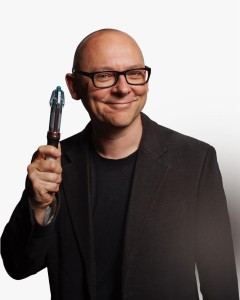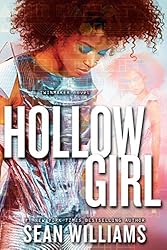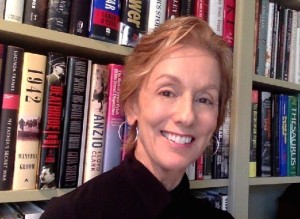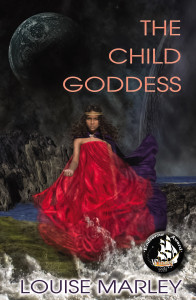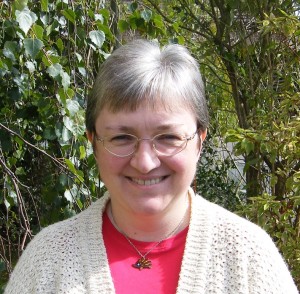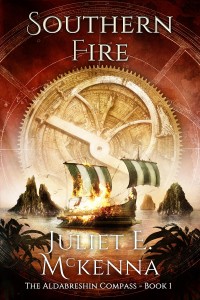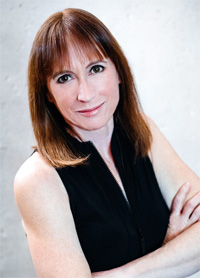 Linda Nagata is a Nebula and Locus-award-winning science fiction and fantasy author whose more recent work includes short fiction like “Nahiku West,” runner up for the 2013 Theodore Sturgeon Memorial Award, and the novel The Red: First Light, a near-future military thriller that was a finalist for both the Nebula Award and the John W. Campbell Memorial Award. Originally self-published, The Red: First Light is now available from Saga Press/Simon & Schuster, along with its sequel The Trials, and the concluding volume of the trilogy, Going Dark.
Linda Nagata is a Nebula and Locus-award-winning science fiction and fantasy author whose more recent work includes short fiction like “Nahiku West,” runner up for the 2013 Theodore Sturgeon Memorial Award, and the novel The Red: First Light, a near-future military thriller that was a finalist for both the Nebula Award and the John W. Campbell Memorial Award. Originally self-published, The Red: First Light is now available from Saga Press/Simon & Schuster, along with its sequel The Trials, and the concluding volume of the trilogy, Going Dark.
Linda has spent most of her life in Hawaii, where she’s been a writer, a mom, and a programmer of database-driven websites. She lives with her husband in their long-time home on the island of Maui.
Is there a literary heroine on whom you imprinted as a child? A first love, a person you wanted to become as an adult, a heroic girl or woman you pretended to be on the playground at recess? Who was she?
So many details of childhood have faded into the mists of time, but one literary heroine I clearly remember is Laura Ingalls Wilder. I loved the Little House on the Prairie books and read every volume our library had on the shelf. These were adventure stories, telling of a life alien to me but one that I could understand—and I’m still drawn to adventure stories.
But I didn’t dream of being Laura. Though the Little House books were based on real life, it was another real-life woman who truly captured my young imagination.
On the pages of National Geographic and in Time/Life nature books I read about the biologist Jane Goodall and her work studying chimpanzees in their natural habitat—living in the rainforest and becoming accepted by these creatures that were so much like us but so different. That, I decided, was what I wanted to do as an adult. And while I ultimately went in a different direction, Jane Goodall’s presence in my imagination surely encouraged an interest in biology and natural history that I still possess.
Can you remember what it was she did or what qualities she had that captured your affections and your imagination so strongly?
The things that most appealed to me as a young girl were exploration, adventure, living in the wild, and animals—animals of all sorts. Our family had the usual dogs, cats, birds, fish, and briefly, horses. I dreamed of more exotic pets. I even had a little book on capturing wild creatures and keeping them as pets. That’s not something I would encourage these days, but it was fun to contemplate at the time. I even set a few live traps, though I never managed to capture a rabbit. Anyway, I was in love with nature and the natural world (still am), and in addition, an interest in science was strongly encouraged in our home.
Enter Jane Goodall: a fiercely intelligent young woman, quiet and soft-spoken, but still daring to go out into the wild, into this beautiful forest, to do Amazing Science, interacting with chimpanzees in their natural environment. It triggered all my checkboxes and I was soon telling people that I was going to be a primatologist.
Really.
I wonder sometimes if I grew up in an alternate reality. I hear other women my age tell of how they were discouraged from pursuing nontraditional interests, but that was never the case for me. My family, and my father in particular, encouraged all kinds of intellectual interests, and I grew up in a changing world, where I was very aware that women like Jane Goodall existed, and that many things were possible.
How does she compare to the female characters in your work? Is she their literary ancestor? Do they rebel against all she stands for? What might your creations owe her?
I’ve never considered this before, but I think a good argument can be made that Jane is a literary ancestor of some of my characters. Determined, independent, finding her own path, taking her own approach. I like to write about women characters with those traits—women who are confident in their own abilities.
Bonus round: How do you feel about the word heroine?
I’m fine with it. I’ll admit that being a woman often feels like a drawback, especially given the sorts of books I like to write—action adventure that is not focused on traditional “women’s issues” (as if women have a limited range of interests!). Still. I’d rather see the feminine accepted and respected, than erased. Granted, some feminized nouns sound a bit archaic, but “heroine” works for me.
About this post: The Heroine Question is my name for a series of short interviews with female writers about their favorite characters and literary influences. Clicking the link will allow you to browse all the other interviews, with awesome people like Kay Kenyon, Louise Marley, Juliet McKenna, and Alex Bledsoe. If you prefer something more in the way of an actual index, it’s here.




